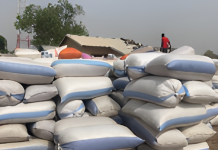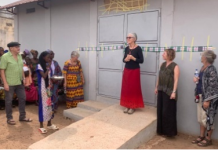By Amie Sanneh
A study commissioned by the Partnership for Aflatoxin Control in Africa (PACA), through the Meridian Institute (USA), reveals that aflatoxin is negatively impacting on the economy, agricultural productivity, livelihood and health of the Gambian population.These findings were disclosed at a two day validation workshop of the draft report on the ‘Situational Analysis for the Mitigation of Aflatoxin within the National Food Safety System of the Gambia’, which started yesterday, 30 September, 2015 at the Senegambia Beach Hotel in Kololi.
In her opening statement, the Permanent Secretary, Office of the President, Ms. Ida Auber said according to the study, an estimated 2,575 deaths have occurred in the Gambia, as a result of cancers caused by aflatoxin.
The study, she said, has brought out the fact that aflatoxin in The Gambia has mpact on human health. She added that aflatoxin also causes stunting in children and is also in children that the highest mortality rate is registered, followed by women.
She explained that the perceived agricultural productivity and food losses along the aflatoxin sensitive commodity chains, such as groundnuts, maize and rice, is a big dent to the Gambia Government’s policy objectives of attaining national and household food security.
Ms. Auber further stated that the aflatoxin challenge continues to have a negative impact on the groundnut exports to the point that they are no longer able to export high value aflatoxin, safe edible groundnuts to international markets for premium prices. “We note with concern our inability to enhance our foreign exchange earnings from groundnut exports due to aflatoxin contamination,” she said.
Computations based on international and actual prices from 2000 to 2014 indicate a cumulative economic loss of about 22.8 million US Dollars, this translates to a loss of 1.5 million US Dollars as an annual average, she stated.
This, she continued, is evident that aflatoxin is having a negative impact on the economy, the lives and livelihoods of the Gambian population.
Madam Auber described the theme of the workshop as topical for aflatoxin continues to post a major challenge to the achievement of agricultural productivity and the attainment of food security. She noted that it is also a major public and animal health problem in addition to its negative impact on international trade.
The fight against aflatoxin therefore, she added, has to be a multi-dimensional and multi-sectoral one . PS Auber noted that the Government of The Gambia will ensure the mainstreaming of aflatoxin in particular, and mycotoxins in general, in all macro economic and sectoral policies and programmes within a coherent national SPS framework, including food safety.
She said the Government looks forward to working closely with the AU Commission/PACA and ECOWAS to achieve the desired outcomes in the fight against aflatoxin.
The West Africa Pilot Country Activity Coordinator of the African Union Commission, Winta Sintayehu, for her part, said PACA is a flagship program of the African Union Commission under the CAADP Program, established in 2011. She explained that the African Union Commission was urged by African Governments and others to oversee the establishment of a Continental SPS Working Group to mainstream sanitary/phytosanitary matters in the CAADP framework and establish an Africa-led Partnership for Aflatoxin Control (PACA). PACA was therefore formally launched at the Joint Conference of Ministers of Agriculture and Ministers of Trade in Addis Ababa, on 31st October 2012, she said.
The Secretariat’s focused mission, she said, is now to improve effectiveness and efficiency of African governments to tackle the aflatoxin problem that countries are currently facing. She added that they will try to create strong partnerships with stakeholders involved in aflatoxin work across the various sectors, and will comprehensively support African governments in mitigating aflatoxins.
“The situational analysis that is to be validated today is part of the work that we envision on gathering evidence to inform a national aflatoxin control plan,” she added.
The Study, she continued, was undertaken by IRIS consulting group who have done a great job work with the various stakeholders within the country to clearly assess the food safety system of the country as well as the economic impact aflatoxins have on the various sector.
She noted that the study will enable them to come up with a clear national plan in mitigating the aflatoxin problem in the Gambia.
Dr. Ernest Aubee, Programme Officer and Head of Agricultural Division at the ECOWAS Commission, said the workshop came at a time when aflatoxin is posing a serious danger to food security, health and trade activities of ECOWAS member states including the Gambia. “Aflatoxin is not only toxic and deadly, its continuous presence in our agricultural system poses greater dangers to the realization of food and nutrition security,” he said.
According to him, aflatoxin should be seen as a developmental challenge that requires the close and active collaboration of all stakeholders in the sectors of agriculture, health, trade and the consuming public.
Dr. Aubee explained that it is in this light that authorities of the African Union with the support of the ECOWAS Commission and other Regional Economic Communities set up in 2012 the Partnership for Aflatoxin Control in Africa (PACA). This initiative, he continued, is to mitigate the dangers of aflatoxin on the African continent. He noted that ECOWAS attaches priority attention in addressing the challenges of aflatoxin in the region by providing the political and technical guidance in empowering the ECOWAS member states to tackle aflatoxin.
Madam Zainab Jallow, the Director General of Food Safety and Quality Aurhority (FSQA) of the Gambia, said they are gathered to validate the findings of the aflatoxin country situational analysis report that was carried out by the national consultants, the Integrated Resources Innovation Services (IRIS), from January to June 2015. She said it is to confirm the reported findings, identify any gap and fill them as appropriate.
“The validated report is expected to inform the National Aflatoxin Strategy and Investment Plan (NASIP) and guide them for intervention to mitigate aflatoxin in the Gambia,” she noted.
The Gambia is one of the five pilot countries where this study has been carried out.
Description: New Image Group photo of participants
Home Latest News Aflatoxin negatively impacts on economy, health of Gambians Reveals a PACA commissioned...





















